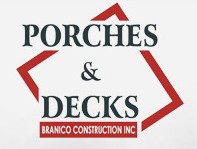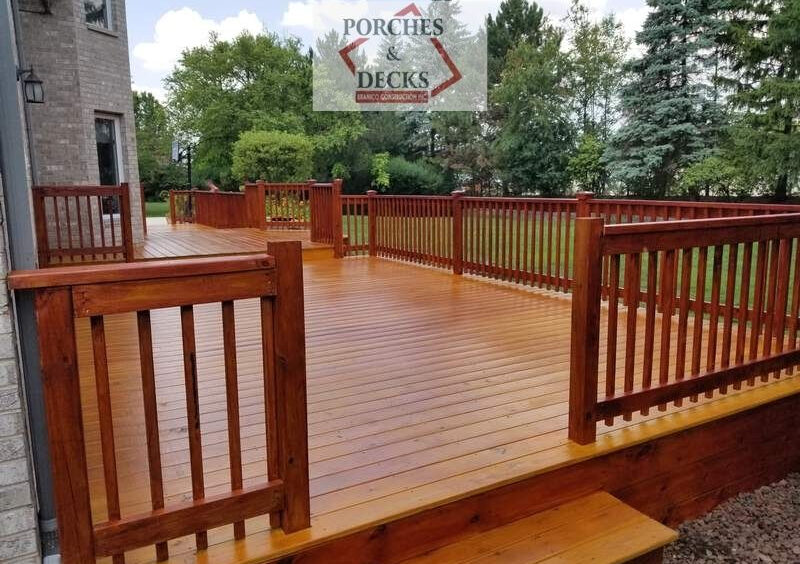Your backyard is ready for summer, but it still lacks… a nice deck for dining al fresco and for basking in the sun. The first step when planning to build a new deck (or porch) is choosing the right material. The warmth of wood or the resistance of composite? Choosing the right material for your Chicago deck project is not easy, as there are numerous options available that will make your deck more enjoyable and add value.
The choice depends mainly on your needs, budget, the layout you want to create, the aesthetic sought, the intended use and your house’s location.
Whatever material you choose, it is strongly recommended that you turn to professional Chicago deck builders, both for the installation of your deck and for deck’s maintenance and deck repair. At Branico Construction we will be able to take care of nearly all your deck and porch needs – from helping you choose the right construction material to providing an expert, professional deck or porch installation and later on – repair and maintenance services.
In this article we’ll take a closer look at all the different possibilities, while taking into account the advantages and disadvantages of the most popular materials and their price.
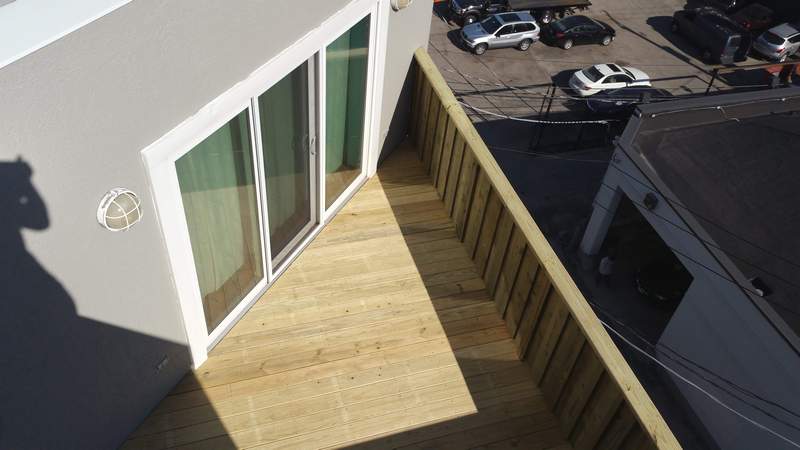 Pressure-treated wood
Pressure-treated wood
Pressure-treated wooden boards have been impregnated in special pressurized tanks where chemical preservatives were forced deep into the wood’s fibers. As a result, all pests, microorganisms and bacteria in the material are eliminated.
Pressure-treated lumber is made from softwood, usually Southern yellow pine, which can easily resist rot, decay and termites. Traditionally, treated wood has a green or brown color and an oily smell. Pressure-impregnated wood is perfect for outdoor use. Increased durability and resistance to weather conditions makes it perfect for porch and deck construction.
Advantages
- Moisture and insect resistant
- Durable
- Easy to work with
- Affordable
Disadvantages
- Prone to cracking and warping
- Not eco-friendly
- Chemical risks
Price: $10-$12 per square foot
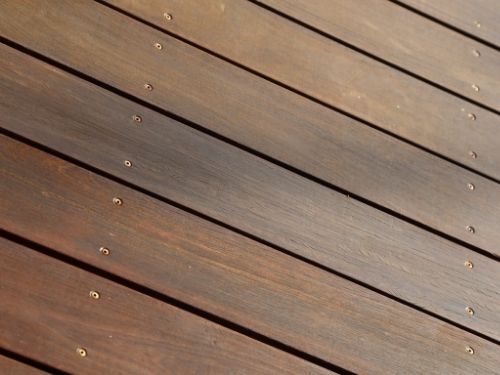 Tropical hardwood
Tropical hardwood
Red Balau, Golden Ironwood, Ipe, Cambara, Cumaru… there are so many types of exotic wood from distant lands such as Africa or Asia. Tropical wood is so dense that it needs no treatment, maintenance or oiling. Naturally rot-proof and weather-resistant, exotic wood is the material par excellence for beautiful and high-quality decks.
Advantages
- Highly durable
- Non-slip
- Stain resistant
- Low maintenance
- Beautiful colors and grains
- Resistant to insects, mold, and fungus
Disadvantages
- Hard to work with
- Expensive
- Very heavy
- Darker shades heat up very fast
Price: $15-$30 per square foot
Western Cedar
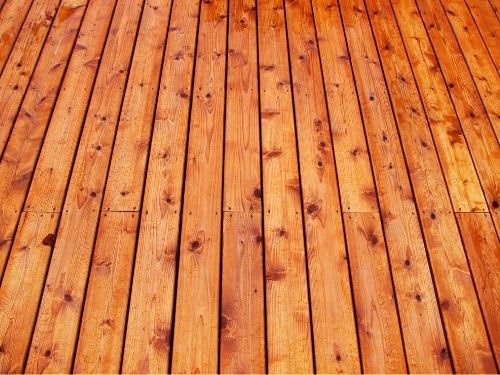 Western Cedar can create a high-quality Chicago deck, with a natural reddish-brown shade and excellent dimensional stability. Red cedar has long been known for its exceptional natural durability and resistance to all weather conditions, and excellent thermal insulation. Thanks to its natural oils that are accumulated in the cells of the wood, it is naturally protected against insects and fungi.
Western Cedar can create a high-quality Chicago deck, with a natural reddish-brown shade and excellent dimensional stability. Red cedar has long been known for its exceptional natural durability and resistance to all weather conditions, and excellent thermal insulation. Thanks to its natural oils that are accumulated in the cells of the wood, it is naturally protected against insects and fungi.
The official name Western red cedar is associated with the fact that it grows in North America all along the BC coast and up into the Alaskan coast. The tree is long-lived and relatively resistant to decay.
Advantages
- Natural and eco-friendly
- Beautiful, classic look
- Rot resistant
- Available with or without knots
Disadvantages
- Soft wood (less resistant to stains and scratches)
- May shrink and crack in the sun
- Life expectancy is only about 15-20 years
- Needs regular maintenance
Price: $17-$22 per square foot
Redwood
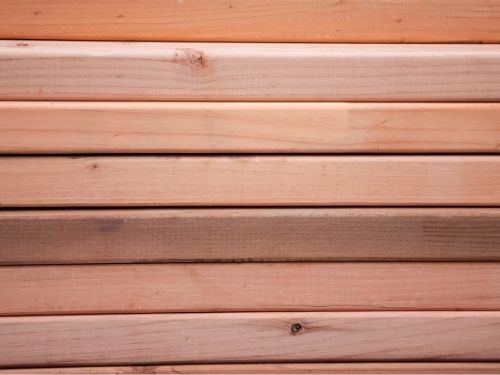 Redwoods are trees native to the coastal mountains of California and Oregon. They grow in a narrow strip that’s just over 435 miles long and 5 to 35 miles wide.
Redwoods are trees native to the coastal mountains of California and Oregon. They grow in a narrow strip that’s just over 435 miles long and 5 to 35 miles wide.
The material itself has a reddish color. Its biggest advantage is high durability and resistance to rotting and pests. Redwood is a valuable raw material because it is one of the few that does not produce resin. It is highly resistant to fire, is very strong and has a long life expectancy.
A typical redwood deck can last up to 30 years with minimal repairs needed if it is well maintained. Redwood also has a lower shrinkage and warp rate, which will keep your Chicago deck looking good for years. If you are a homeowner looking for a greener and more eco-friendly material, redwood is your deck option. It stores more carbon than it emits, making it safer for you and your family, as well as the environment.
Advantages:
- Fire and pest resistant
- Natural and eco-friendly
- Strong but light
- Beautiful red color
- Elegant
- Can last up to 30 years with proper maintenance
- Affordable
Disadvantages:
- Requires regular maintenance, repairs and sealing
- Prone to denting and splintering
- High-quality, stainless steel fasteners must be used
- Endangered species due to overharvesting
Price: $5-$25 per square foot
Composite wood
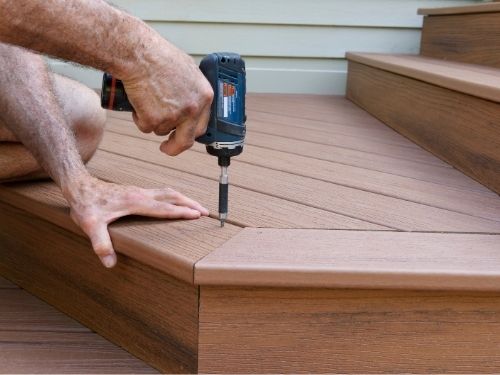 Composite wood is made from a mixture of wood and PVC. It combines the qualities of the two materials, at a price that is generally comparable to natural wood. As its wood is generally from local forests, it is more ecological than exotic wood, but above all it is easier to maintain. Practical like plastic, warm like wood, composite wood also offers a wide range of colors and is rather easy to install. It is resistant to UV rays and is quite solid. However, there are different qualities and some models can warp over time. So be sure to choose a material that meets your expectations and works with your budget. Give us a call and our expert Chicago deck builders will assist you with your project.
Composite wood is made from a mixture of wood and PVC. It combines the qualities of the two materials, at a price that is generally comparable to natural wood. As its wood is generally from local forests, it is more ecological than exotic wood, but above all it is easier to maintain. Practical like plastic, warm like wood, composite wood also offers a wide range of colors and is rather easy to install. It is resistant to UV rays and is quite solid. However, there are different qualities and some models can warp over time. So be sure to choose a material that meets your expectations and works with your budget. Give us a call and our expert Chicago deck builders will assist you with your project.
Advantages:
Weather resistant
- Light
- Easy to install
- Made from recycled materials
- Resistant to stains and fading
- Easy to clean and maintain
Disadvantages:
- Some brands look obviously fake or cheap
- High initial cost
- More expensive than natural wood
- Hidden fasteners create more maintenance problems
- The boards can get hot to the touch in the sun
Price: $4-$13 per square foot
Branico Construction – Expert Chicago deck builders
